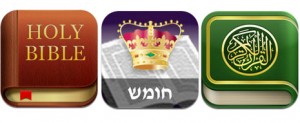 At The Washington Post, Lisa Miller argues that, contrary to the beliefs of religious figures and political pundits, technology is good for religion. Citing the popularity and utility of religiously-themed iPhone and Android applications, like FlyRight, Miller contends that technology has the power to enhance religious experience and can supplement religious practice:
At The Washington Post, Lisa Miller argues that, contrary to the beliefs of religious figures and political pundits, technology is good for religion. Citing the popularity and utility of religiously-themed iPhone and Android applications, like FlyRight, Miller contends that technology has the power to enhance religious experience and can supplement religious practice:
Take the Sikh app, for instance. It’s cool on a practical level. It distributes pertinent information to a specific group in need of that information. But it also has perhaps unintended spiritual and religious consequences. It encourages among users a broad sense of community and mutual support, which is what good religion does. It abets religious affiliation, promotes action in the face of injustice or oppression, and welcomes outsiders, or anyone who experiences discrimination at airports, to use the app and see themselves, in some way, as Sikhs.
All the best religion apps do this: They support religious practice rather than substituting for it. Michael McBride, an economist at the University of California at Irvine, teaches a freshman course called the Economics of Religion. Understanding that religion is always about people making choices, he asks students to research the coolest religion apps. He also showcases some of his favorites, including Insight Timer, which announces the start and end of Zen meditation sessions with the chiming of bells: “Crystal clear, with extra long fade-outs.”
“Most of these apps do not replace community groups,” he says. “But they do enhance them. Technology creates new opportunities, new choices. It changes the way that people can interact. It can change things.”
People with personal practice of faith know this better than the pundits. When I asked Twitter followers to tell me which religion apps they liked best, the point came home. One person said she liked Carry Your Faith, designed by a group within the Roman Catholic Archdiocese of Boston, which allows business travelers, busy people and shut-ins to “go” to Mass every morning at 9:30 (and if they can’t make it live, to see it rebroadcast throughout the day). Also very popular are digital versions of Scripture, which can be loaded onto an iPhone or Android phone and toted in a pocket or purse: Half a million people “like” the Bible app called Youversion in the Google store. For Muslims, there’s Quran Android and iQuran Pro.
Read the full article here.












